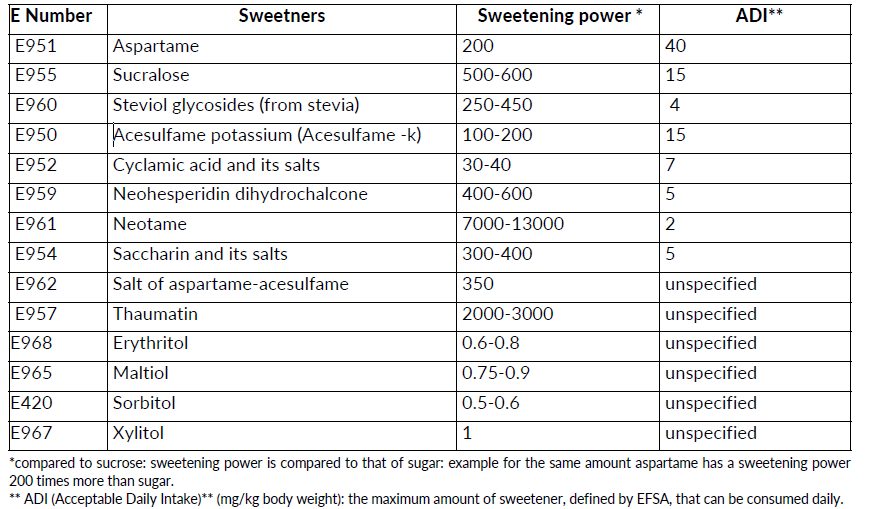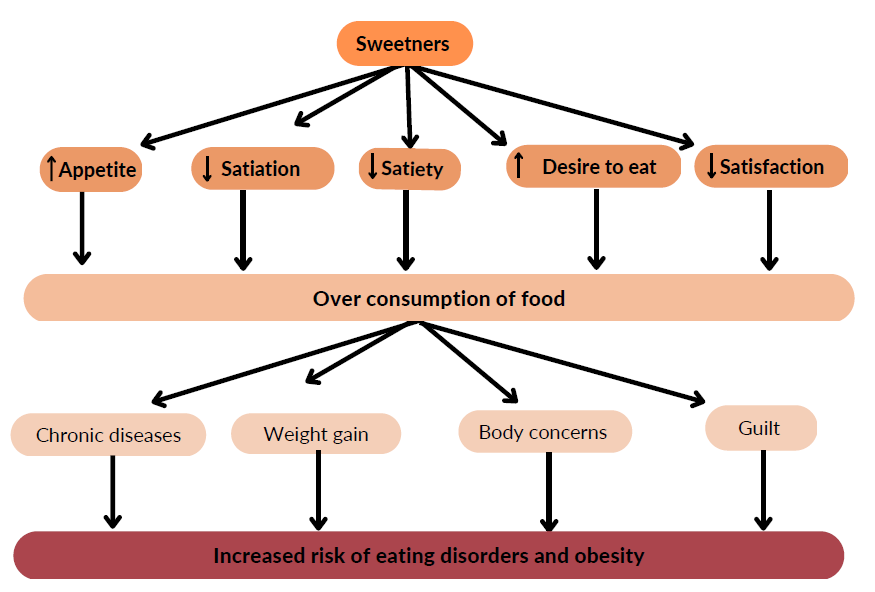Sweeteners And Their Impacts On Our Health
Source : BNP Paribas validated by the Rouen University Hospital
Summary
- Sweeteners, what are they?
- The different types of sweeteners
- Effects of sweeteners on health
- Conclusion
Sweeteners, what are they?
A sweetener is any substance that gives a sweet taste. Nowadays, the use of the term sweeteners is often restricted to substances that gives a sweet taste and few or no calories.
Sweeteners are a part of food additives that can be synthesized chemically or from plant extracts (stevia …).
Since their appearance in the 1800s, the use of sweeteners is more and more frequent. They are most often used as an alternative to sugar. The consumption of products containing sweeteners is increasing because they allow to reduce the amount of added sugar and calories ingested, while maintaining the sweetness of the product.
Sweeteners are present in many processed products such as “light” foods (jams, cakes, yoghurts, ice creams …), “light” drinks, candy, gum and others. It can also be found in the form of “table sweetener” (powder, tablets…). In total, more than 23 000 products in the world contain sweeteners.
.
Sweeteners have a significantly higher sweetening power than sucrose, which is the molecule that constitutes table sugar. For example, aspartame has a sweetening power 200 times higher than sugar : a much smaller amount of aspartame provides a similar sweet taste.
As for all additives, sweeteners have to be evaluated and validated by the EFSA (European Food Safety Authority) to be used, within the European Union. An identification number beginning with the letter E is assigned to these food additives, which allows an easy identification.
The different types of sweeteners:
- Natural sweeteners (sucrose (table sugar), glucose, fructose …): they come from natural sources, for exemple sucrose is extracted from sugar cane or beets and fructose is present in fruits.
- Nutritive sweeteners (polyols: isomalt, sorbitol, mannitol…): their sweetening power is quite close to that of table sugar (from 0.5 to 1.4). They are used in many chewing gums and sweets…
- Intense sweeteners (saccharin, cylamate, aspartame, sucralose, acesulfame …): their sweetening power is higher than that of other sweeteners (nutritive and natural).
Some examples of sweeteners authorized in Europe:

How to identify sweeteners in food products?
According to EFSA regulations, sweeteners and their function must be included in the list of ingredients present on the label of each product. It is therefore necessary to read the labels carefully to identify the presence of sweeteners in the products you buy or consume.

Effects of sweeteners on health
 Despite the fact that many national and international authorities recognize sweeteners as being safe and well tolerated, the safety of these additives is currently under debate. Indeed, some sweeteners are currently being re-evaluated by several health authorities and some recent scientific studies highlight their potential health risks.
Despite the fact that many national and international authorities recognize sweeteners as being safe and well tolerated, the safety of these additives is currently under debate. Indeed, some sweeteners are currently being re-evaluated by several health authorities and some recent scientific studies highlight their potential health risks.
Body weight
Generally, the amount of sweeteners consumed provides few or no calories, that is why
they are often considered to promote weight loss through a reduction in energy intake.
However, studies do not show conclusive evidence on the effect of sweeteners
consumption on weight loss and BMI (body mass index). On the contrary, studies have
shown a correlation between the consumption of sweeteners and an increased risk of
obesity (see section on eating habits).
Diabetes and blood sugar
According to recent scientific studies, sweeteners do not reduce the risk of type 2
diabetes, but rather, higher intakes of sweeteners have been associated with an
increased risk of developing insulin resistance and type 2 diabetes.
Cardiovascular diseases
A high intake of beverages containing sweeteners (> 1 drink per day) is associated with
32% increased risk of cardiovascular events, 19% increased risk of all types of stroke,
and 13% increased risk of hypertension. In addition, the consumption of food products
(table sweetener, low-fat desserts, etc.) containing sweeteners (erythritol) increases
the risk of cardiovascular events.
Intestinal microbiota
The consumption of sweeteners, such as saccharin, sucralose and aspartame, can alter the composition of the intestinal microbiota and induce a dysbiosis . Indeed, some modifications of the bacterial diversity of the microbiota and a disturbance of the intestinal barrier (↑ permeability) are associated with the consumption of
sweeteners (aspartame, acesulfame-K).
Some studies have shown that the consumption of Acesulfame-K increases Firmicutes bacterial populations and reduces the number of bacteria Akkermansia muciniphila, which are changes also observed during obesity. Steviol glycosides and other sweeteners could interact directly with the gut microbiota and thus alter the bacterial population and their functions.
Eating behavior
The consumption of sweeteners can be associated with a significant decrease in
satiety and satiation sensation as well as an increase in appetite and the desire
to eat. Thus, repeated consumption of sweeteners could induce a disturbance of
food sensations (hunger, satiety…) but also of food pleasure.
Moreover, sweeteners generally offer less pleasure compared to sugar and
therefore less satisfaction after their consumption which could promote over
consumption of food, leading to a higher risk of weight gain, chronic diseases
and eating disorders.
A study comparing users and non-users of beverages containing sweeteners found that heavy users have greater body concerns and guilt related to overeating.
Gastrointestinal disorders:
Numerous studies have highlighted difficulties to tolerate some food addictives.
Indeed, if consumed at high doses, some sweeteners such as polyols, can induce
gastrointestinal symptoms such as flatulence, bloating, abdominal discomfort and a
laxative effect.

Cancer
- An observational study including 102,865 adults from the French NutriNet-Santé cohort found an association between sweetener consumption and the risk of cancer. Indeed, the most frequent consumers of sweeteners have a higher risk of cancer, compared to non-consumers. Aspartame and acesulfame-K are the sweeteners that were linked to the most important risk of cancers.
In the brain
- One study with a 6-year follow-up period, showed a non significant decrease in the cognitive function of participants over 55 years old consuming artificially sweetned beverages more than once a month. However, in another study, with a 10-year follow-up period, the risk of developing dementia or Alzheimer’s disease was higher in adults over 60 years old who consumed beverages containing sweeteners daily compared to those who did not.
Conclusion
- Further studies are needed to confirm the health risks of sweetener consumption and to elucidate how they affect our health. However, recent studies show more and more warning signs about the risks of sweetener consumption. Moreover, no benefit (weight loss, risk of diabetes…) of sweetener consumption has been demonstrated.
- → The ideal is therefore to limit as much as possible the consumption of sweeteners and thus of ultra-processed products.
-
Download the PDF version here
pdf – 2 MB
 You might be interested in these articles
You might be interested in these articles